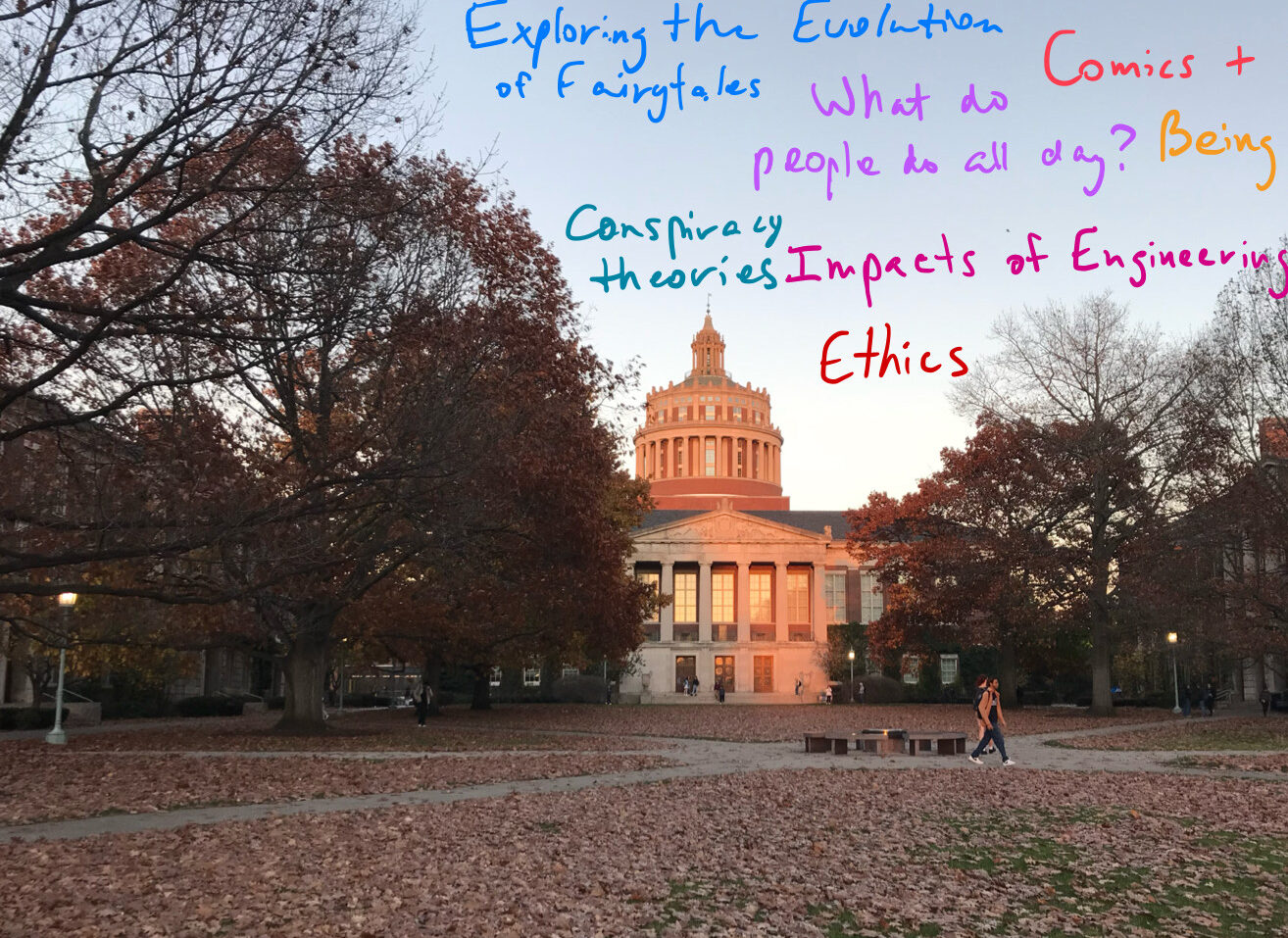The pen is mightier than the sword. Wait, what do you do with the pen anyway? Write.
If you’ve perused any of the University of Rochester’s web pages, you have likely encountered the Rochester Curriculum in some form: one major, two clusters, no general education requirements. It’s the reason I came here, as well as a lot of my friends! But there’s a crucial third component: the primary writing requirement, also known as WRTG 105.
Course offerings are plentiful for WRTG 105, with a small group of 12-15 students for each section. Instructors for 105 vary from professors within the Writing, Speaking and Argument Program, and graduate students in advanced stages of their degree who are usually pursuing topics within the Humanities and Social Sciences. Depending on your major, your introductory classes during your first year could be quite large – I had a 400-person biology lecture my first semester. 105 is a guaranteed small class where you know you’ll be able to make strong connections with your instructor and other students.
What differentiates 105 sections? Everything. Well ok, you’ll learn about academic citations, general concepts of finding sources and using them in an argumentative research paper, and clear, effective writing. But the true beauty of this system, of there being so many classes to choose from, is that every 105 has a different theme. Each instructor gets to design their own course, meaning that they’re taking you through readings that they found interesting and selected. No other 105 section was reading the same pieces as mine: you essentially get a writing class and a miniature literature class in one, on the topic of your choosing!
Topics span incredible breadth: mine was entitled Ever After: Exploring the Evolutions of Fairytales. I’ve heard of Being Homo Sapiens, Monsters Everywhere, Impacts of Engineering, American Horror Stories, Korean Popular Culture on the Global Stage, Venturing Out: Making Meaning and Finding Adventure in the Outdoors, Comics and Culture, and so many more!
Whatever you want to learn and write about, you probably can. This means that the papers that you’re assigned will likely be on topics that are of interest to you! What kind of assignments are you even going to have in a writing class, anyway? Just put words on the paper? Not exactly. WRTG 105 aims to take you through the process of writing, giving you methods and tools to use in the rest of your collegiate writing. There are readings of some form for each biweekly lecture which are then discussed as a group, and between 6 to 10 short assignments throughout the semester known as Informal Assignments. The bigger assignments, of which there are usually three, are known as the Formal Assignments (FAs) – these are the papers. But you’re not left to your own devices with the prompt. You’ll explore strategies like reverse outlining and brainstorm maps, and hold both group feedback sessions and individual conferences with your instructor to get a sense of what readers are understanding from your paper at different stages of the writing process.
To be perfectly honest, I did not want to take WRTG 105. I’d gone to a writing-focused school for high school, and I knew I was at least somewhat decent. I went so far as to opening the petition to substitute WRTG 105 with a different, writing-focused class, but couldn’t bring myself to submit it. My reasoning was that I liked fairy tales, and it wasn’t even guaranteed to be approved (I suspect the best-case argument would be if you’d taken a college composition class somewhere else); I might as well take a class that I knew I would enjoy.
And to no one’s surprise, taking 105 turned out to be the correct idea. College writing is actually pretty different from what I’d done before, not even accounting for the fact that my high school experience was entirely in French. Between reading peer-reviewed research articles and feedback from my wonderful instructor Meghan, I began to grasp the nuances of argumentative writing in English, especially the importance of stating your thesis in the introduction and using transition statements and callback topic sentences throughout longer papers. 105 ended up being one of my favorite courses that semester! For my FA#3, the 8-10 page research paper which is the most important 105 assignment, I wrote about representations of the immigrant experience in Neil Gaiman’s American Gods, which was one of my favorite books at the time. You heard it correctly: I got to reread my favorite book and call it research!
WRTG 105 continues to influence my life and college writing long after I completed the course. Inspired to continue my writing journey, I became a Writing Fellow through the Writing, Speaking, and Argument Program (WSAP) – my recommender for my application was my 105 instructor – and I now tutor students for academic writing across all disciplines, including first-year students experiencing 105. It’s always delightful to learn about what new course sections are being offered, and each research paper is unique, meaning that I get to learn about an immense variety of topics that students are passionate about.
If you’re feeling apprehensive about 105, I promise you’ll be okay. Maybe wait to take it until the spring semester, so you can hear about it from your friend who’ll take it in the fall. If you went to high school in another language, consider taking 105 E, which has an extra meeting time every week to work on assignments in an organized setting, or 105 A and B, which distribute the course over two semesters. The WSAP is here to help you become the best writer you can be, at a pace you’re comfortable with. You can also come to the Writing Fellows for assistance: maybe I’ll get to meet you someday!

